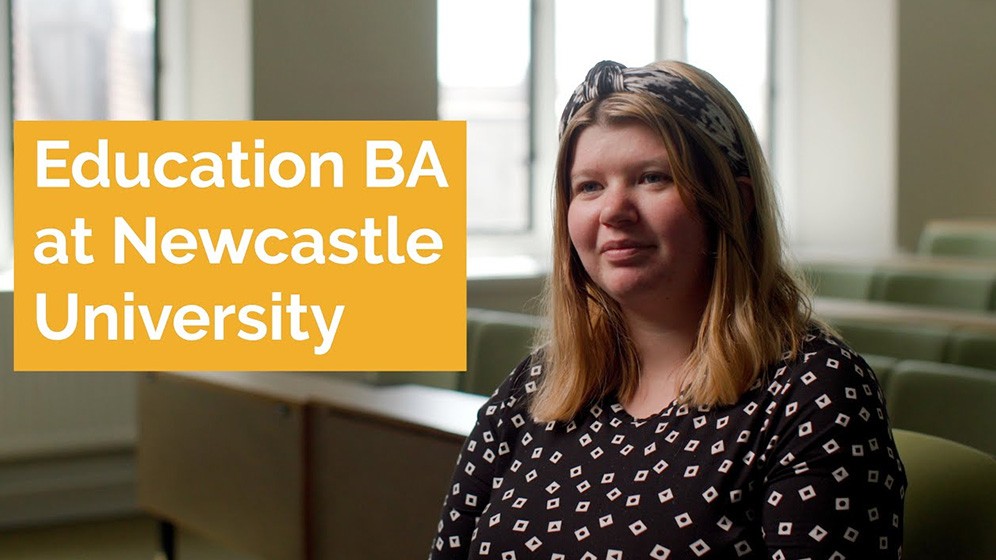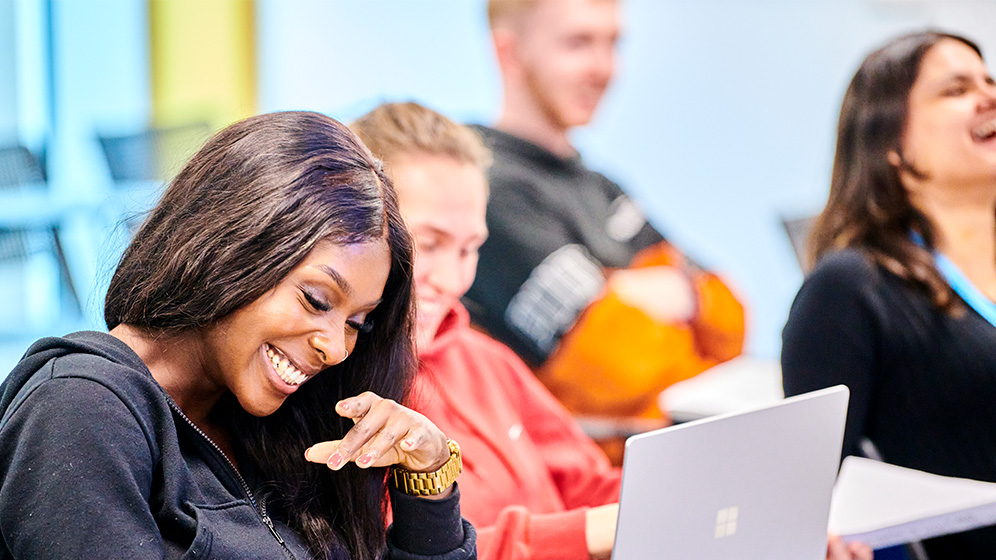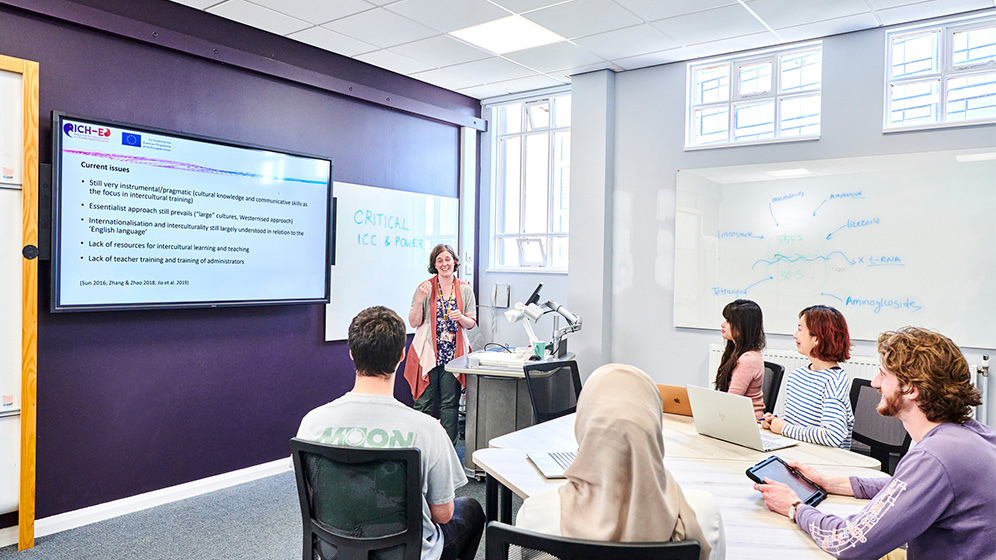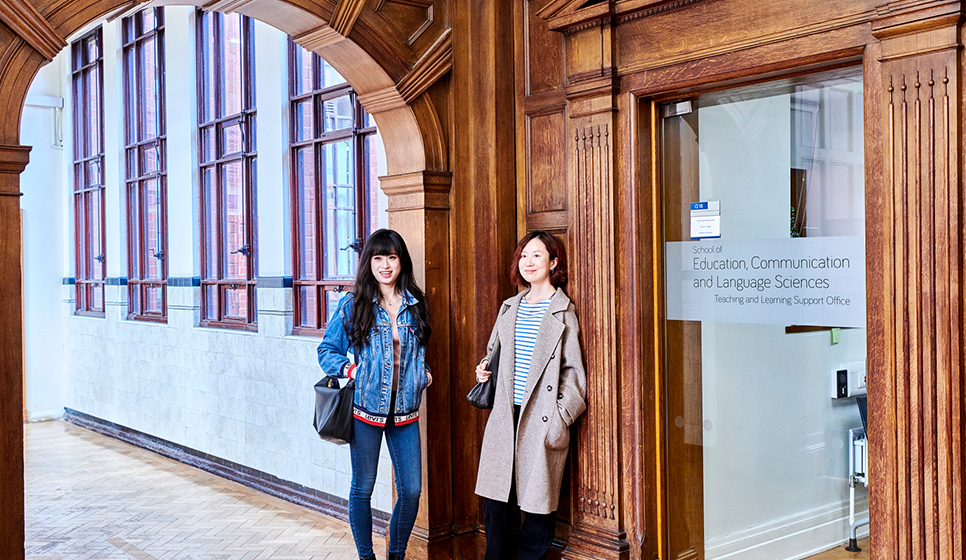Education BA Honours
- UCAS code: X390
- Full time
- 3 years
Explore education in different contexts across the globe and equip yourself with the ability to inspire, support and engage with people of all ages.
You are currently viewing course information for entry year: 2026
Next start date:
- September 2026
UCAS Institution name and code:
- NEWC / N21
Course overview
Our Bachelor of Arts (BA) Honours in Education explores the study of education across the globe. You'll consider sociological, philosophical, historical, political, and psychological perspectives.
Explore the differences between formal and informal learning environments, from museums, art galleries and community organisations to the more structured environments of schools, colleges, and universities.
Examine issues relating to teaching and learning across a wide range of age phases, from early years to lifelong learners. Learn about the relationships between teacher and learner and how these change over time.
Investigate the role of international development in supporting education in developing countries. Explore barriers, such as poverty and access, on a wider geographical scale.
Enhance your employability and gain real world experience through optional work placements in schools, charities and businesses.
Develop a diverse set of research, communication and critical analysis skills that will set you on a path to wide range of careers.
Tailor your degree to your interests through a range of optional modules covering topics such as:
- gender
- digital learning
- social justice
- special educational needs
You’ll also have the option to study modules from:
- modern languages
- sociology
- business
- politics
Your course and study experience - disclaimers and terms and conditions
Please rest assured we make all reasonable efforts to provide you with the programmes, services and facilities described. However, it may be necessary to make changes due to significant disruption, for example in response to Covid-19.
View our Academic experience page, which gives information about your Newcastle University study experience for the academic year 2025-26.
See our terms and conditions and student complaints information, which gives details of circumstances that may lead to changes to programmes, modules or University services.
Quality and ranking
Professional accreditation and recognition
All professional accreditations are reviewed regularly by their professional body.
Modules and learning
Modules
The information below is intended to provide an example of what you will study.
Most degrees are divided into stages. Each stage lasts for one academic year, and you'll complete modules totalling 120 credits by the end of each stage.
Our teaching is informed by research. Course content may change periodically to reflect developments in the discipline, the requirements of external bodies and partners, and student feedback.
Featured module
EDU2010: Gender and EducationExamine the evolution of ideas about natural and socially constructed differences between the sexes up to the present day. Explore the impact of these ideas upon the education system.

Optional module availability
Student demand for optional modules may affect availability.
Full details of the modules on offer will be published through the Programme Regulations and Specifications ahead of each academic year. This usually happens in May.
To find out more please see our terms and conditions
You’ll build key foundational knowledge around the study of education.
Modules
* You may have the option of choosing a different module with approval from the Degree Programme Director
Modules
In your second year you will study specialist aspects of education enabling you to apply theory to practice.
Modules
| Compulsory Modules | Credits |
|---|---|
| Psychological perspectives on teaching and learning | 20 |
| Schools, Statistics and Stories: Researching Education | 20 |
| Globalisation and Development | 20 |
In your final year you’ll continue to explore and develop your own interests, delving deeper into issues that interest you the most. You’ll also complete a research dissertation on a topic of your choosing.
Modules
| Compulsory Modules | Credits |
|---|---|
| Research Dissertation | 40 |
Additional compulsory module information
You'll also take:
| Modules | Credits |
|---|---|
| Responding to Special Educational Needs | 20 |
| Social Justice and Education | 20 |
We base these figures and graphs on the most up-to-date information available to us. They are based on the modules chosen by our students in 2024-25.
Teaching time is made up of:
- scheduled learning and teaching activities. These are timetabled activities with a member of staff present.
- structured guided learning. These are activities developed by staff to support engagement with module learning. Students or groups of students undertake these activities without direct staff participation or supervision
Teaching and assessment
Teaching methods
You’ll learn through a combination of:
• lectures
• seminars
• tutorials
• workshops and practical tasks
• independent study
Assessment methods
You'll be assessed through a combination of:
-
Case studies
-
Coursework
-
Dissertation or research project
-
Essays
-
Group work
-
Portfolio submission
-
Presentations
-
Projects
-
Reflective report/journal
-
Reports
-
Seminar tasks/exercises
Skills and experience
Real business skills
Optional work placements provide you with the opportunity to develop a wide range of transferrable skills in real-world settings, including:
- written and verbal communication for a variety of audiences
- critical analysis
- time management
- organisation and planning
- teamwork and collaboration
- leadership
Research skills
Throughout your degree you’ll develop your analytical, investigative and research skills enabling you to produce your own original research dissertation in your final year.
Opportunities
Work Placement
You’ll have the opportunity to take two work placement modules during your degree. Our strong local and global connections have allowed our students to secure work placements in a variety of areas and roles, including:
- schools
- international development organisations
- charities - UK and International
- working with refugees of all ages
- english as a foreign language
Facilities and environment
Facilities
You'll be based in the School of Education, Communication and Language Sciences, which has a wide range of facilities for studying how people learn and communicate.
There's a well-equipped Education Resource Centre with excellent computing facilities.
We have an active Research Centre engaging with the latest thinking and research in education. The Centre for Learning and Teaching (CfLaT) researches teaching and learning in different contexts.
Sorry, you need JavaScript to view this video
Support
You'll have the support of an academic member of staff as a personal tutor throughout your degree to help with academic and personal issues.
Peer mentors will help you in your first year. They are fellow students who can help you settle in and answer any questions you have when starting university.
Your future
Join a network of successful graduates
This course prepares you for a wide range of careers across the globe. Our graduates have gone on to work in:
- education management
- community / health work
- widening participation
- rehabilitation programmes
- human resources
- local authorities
- museums and heritage
- digital learning
- environmental organisations
- teaching English abroad
- education research
Further Study
This course is excellent preparation for further postgraduate study. If you’d like to become a teacher, our Primary PGCE may be of interest.
Make a difference
Sorry, you need JavaScript to view this video
Careers support
Our Careers Service is one of the largest and best in the country, and we have strong links with employers. We provide an extensive range of opportunities to all students through our ncl+ initiative.
Visit our Careers Service website
Recognition of professional qualifications outside of the UK
If you’re studying an accredited degree and thinking about working in Europe after you graduate, the best place to find current information is the UK Government’s guidance on recognition of UK professional qualifications in EU member states. This official resource explains whether your profession is regulated in another country, what steps you need to take, and which organisation you should contact.
Entry requirements
All candidates are considered on an individual basis and we accept a broad range of qualifications.
The entrance requirements and offers below apply to 2026 entry.
| A-Level | |
|---|---|
| International Baccalaureate | |
|---|---|
Other UK and the Republic of Ireland qualifications
Alternative offers at Newcastle
Through one of our contextual or alternative offer routes, you could receive an offer of up to three grades lower than the typical requirements.
Contextual offers
We use certain contextual data from your UCAS form, alongside your application, to consider challenges that you may have faced in your education and the potential effect this may have had on your qualifications. This means you may be eligible to receive a lower contextual offer.
PARTNERS offers
One of the largest and longest support entry routes to university of its kind for students from underrepresented backgrounds. We support applicants from application through to study.
Realising Opportunities offers
A unique programme delivered in collaboration with 10 leading, research-intensive universities in the UK. The programme is open to students in Year 12/first year of college.
Pathways to Newcastle offers
Pathways to Newcastle, our national skills entry route, is available for specific subject areas.
High Performance Athletes
We support promising athletes at the application stage, who compete in regional, national or international levels in their sport.
Qualifications from outside the UK
English Language requirements
Entrance courses (INTO)
International Pathway courses are specialist programmes designed for international students who want to study in the UK. We provide a range of study options for international students in partnership with INTO.
These courses are specifically designed for international students who want to study in the UK and progress onto one of our undergraduate degrees. Our International Study Centre, has a range of study options including:
- International Foundation
- International Year One
- English Language courses
Find out more about International Pathway courses
Admissions policy
This policy applies to all undergraduate and postgraduate admissions at Newcastle University. It is intended to provide information about our admissions policies and procedures to applicants and potential applicants, to their advisors and family members, and to staff of the University.
University Admissions Policy and related policies and procedures
Credit transfer and Recognition of Prior Learning
Recognition of Prior Learning (RPL) can allow you to convert existing relevant university-level knowledge, skills and experience into credits towards a qualification. Find out more about the RPL policy which may apply to this course.
Tuition fees and scholarships
Tuition fees for academic year 2026-2027
The 2026 entry home fees have not yet been confirmed.
| Qualification: BA Honours | |
|---|---|
|
Home students full time 3 years |
Tuition fees (Year 1)
Not set |
|
International students full time 3 years |
Tuition fees (Year 1)
24,500 |
Year abroad and additional costs
For programmes where you can spend a year on a work placement or studying abroad, you will receive a significant fee reduction for that year.
Some of our degrees involve additional costs which are not covered by your tuition fees.
Scholarships
Find out more about:
Open days and events
You'll have a number of opportunities to meet us throughout the year at our on-campus and virtual open days.
You'll be able to:
- explore our beautiful campus
- find out about our vibrant city
- discover what students think about studying at Newcastle
You'll also have the opportunity to speak to academic staff and find out more about the subjects you're interested in.
Find out about how you can visit Newcastle in person and virtually.
We regularly travel overseas to meet with students interested in studying at Newcastle University. Visit our events calendar to find out when we're visiting your region.
How to apply
Apply through UCAS
To apply for undergraduate study at Newcastle University, you must use the online application system managed by the Universities and Colleges Admissions Service (UCAS). All UK schools and colleges, and a small number of EU and international establishments, are registered with UCAS. You will need:
- the UCAS name and institution codes for Newcastle University (NEWC/N21)
- the UCAS code for the course you want to apply for
- the UCAS 'buzzword' for your school or college
If you are applying independently, or are applying from a school or college which is not registered to manage applications, you will still use the Apply system. You will not need a buzzword.
Apply through UCASApply through an agent
International students often apply to us through an agent. Have a look at our recommended agents and get in touch with them.
Get in touch
By phone
Call us on +44 (0) 191 208 3333 and press option 1. Our opening hours are Monday to Friday 10am until 4pm.
Live chat
Our NCL chatbot might be able to give you an answer straight away. If not, it’ll direct you to someone who can help.
You'll find our NCL chatbot in the bottom right of this page.
Online
Chat to our students
Choosing a university is a big decision. If you've got questions about a particular course, student life or the city of Newcastle, why not chat to our friendly students or graduates!
Keep updated
We regularly send email updates and extra information about the University.
Receive regular updates by email














